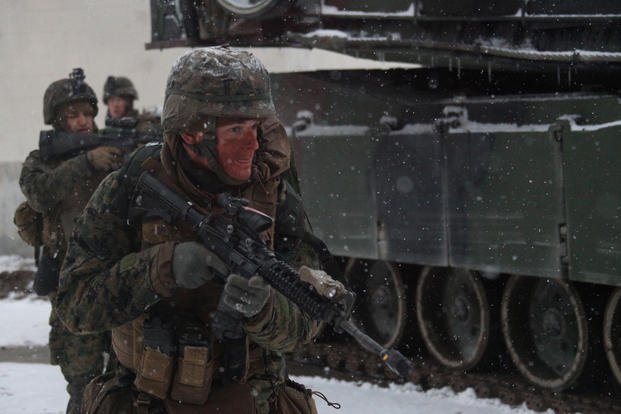The Marine Corps needs to shed some weight as it braces for a new kind of fight.
That's how Commandant Gen. David Berger put it to reporters during a Wednesday roundtable at the Pentagon.
"We are too heavy, too cumbersome," Berger said. "We are built for another Desert Storm. We have to go on a diet."
The U.S. is facing serious threats from China and Russia, he said, and the service must have Marines in the right jobs to take them on. That could mean cutting some Marines' military occupational specialties and moving those troops into new roles.
The commandant is now leading a 10-year effort that he said could phase out some Marines' jobs and shake up their career paths as the service reorganizes. In the planning guidance he released to the Marine Corps this summer, Berger called force design his No. 1 priority.
He declined to say whether the service has already identified any existing specialties that are likely to face cuts or how many could get the ax. Some of the changes could be driven by technology advancements, he said.
The commandant told Military.com earlier this year that he'd also be willing to make personnel cuts to pay for badly needed upgrades to equipment and training ranges.
Related: New Commandant Says He'd Consider a Smaller Marine Corps as Requirements Change
If the Marine Corps is getting rid of an outdated piece of equipment or gear, men and women who operate them might be asked by make lateral moves into a new specialty. He compared it to the way pilots move into new aircraft when legacy platforms are retired.
In his planning guidance, Berger told Marines the service "must change."
"The current force is not organized, trained, or equipped to support the naval force -- operating in the contested maritime spaces, facilitating sea control, or executing distributed maritime operations," he said.
Marines must realize that no piece of equipment defines them, no matter how effective they've been in past fights. They "must divest of legacy capabilities that do not meet our future requirements," he said.
By stretching the reorganization out over a decade, Berger said the Marine Corps will have a chance to retrain a leatherneck whose MOS has been eliminated.
For a force that has faced years of post-war personnel cuts, eliminating specialties might cause a panic. But MOSs going away shouldn't scare Marines, Maj. Eric Flanagan, Berger's spokesman, said.
Sgt. Maj. Troy Black, the service's senior enlisted leader, used to serve as a Hawk missile operator before that job was phased out.
A Marine's MOS might be cut, but they still have a shot at becoming the sergeant major of the Marine Corps, Flanagan said.
-- Gina Harkins can be reached at gina.harkins@military.com. Follow her on Twitter @ginaaharkins.
Read more: New Marine Corps Video Aims to Set the Public Straight About What Jarheads Do














